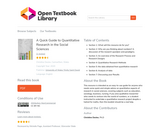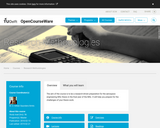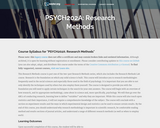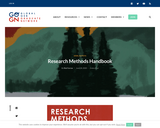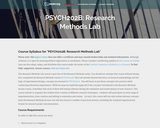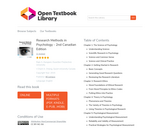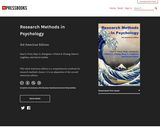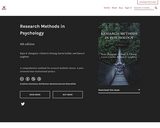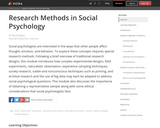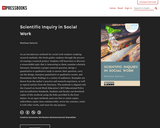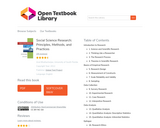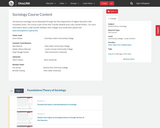Table of Contents
Chapter 1: The Science of Psychology
Understanding Science
Scientific Research in Psychology
Science and Common Sense
Science and Clinical Practice
Chapter 2: Getting Started in Research
Basic Concepts
Generating Good Research Questions
Reviewing the Research Literature
Chapter 3: Research Ethics
Moral Foundations of Ethical Research
From Moral Principles to Ethics Codes
Putting Ethics Into Practice
Chapter 4: Theory in Psychology
Phenomena and Theories
The Variety of Theories in Psychology
Using Theories in Psychological Research
Chapter 5: Psychological Measurement
Understanding Psychological Measurement
Reliability and Validity of Measurement
Practical Strategies for Psychological Measurement
Chapter 6: Experimental Research
Experiment Basics
Experimental Design
Conducting Experiments
Chapter 7: Nonexperimental Research
Overview of Nonexperimental Research
Correlational Research
Quasi-Experimental Research
Qualitative Research
Chapter 8: Complex Research Designs
Multiple Dependent Variables
Multiple Independent Variables
Complex Correlational Designs
Chapter 9: Survey Research
Overview of Survey Research
Constructing Survey Questionnaires
Conducting Surveys
Chapter 10: Single-Subject Research
Overview of Single-Subject Research
Single-Subject Research Designs
The Single-Subject Versus Group “Debate”
Chapter 11: Presenting Your Research
American Psychological Association (APA) Style
Writing a Research Report in American Psychological Association (APA) Style
Other Presentation Formats
Chapter 12: Descriptive Statistics
Describing Single Variables
Describing Statistical Relationships
Expressing Your Results
Conducting Your Analyses
Chapter 13: Inferential Statistics
Understanding Null Hypothesis Testing
Some Basic Null Hypothesis Tests
Additional Considerations
From the “Replicability Crisis” to Open Science Practices
About the Book
The present adaptation constitutes the second Canadian edition and was co-authored by Rajiv S. Jhangiani (Kwantlen Polytechnic University) and I-Chant A. Chiang (Quest University Canada) and is licensed under a Creative Commons Attribution-NonCommercial-ShareAlike 4.0 International License. Revisions include the following:
Chapter 1: Added a description of the “Many Labs Replication Project,” added a reference to the Neurobonkers website, and embedded videos about open access publishing, driver distraction, two types of empirical studies, and the use of evidence to evaluate the world around us.
Chapter 2: Updated the exemplar study in the chapter overview, added relevant examples and descriptions of contemporary studies, provided a link to an interactive visualization for correlations, added a description of double-blind peer review, added a figure to illustrate a spurious correlation, and embedded videos about how to develop a good research topic, searching the PsycINFO database, using Google Scholar, and how to read an academic paper.
Chapter 3: Added in LaCour ethical violation. Revised chapter headings and order to reflect TCPS-2 moral principles.
Chapter 4: Added in difference between laws and effects and theoretical framework.
Chapter 5: Added fuller descriptions of the levels of measurement, added a table to summarize the levels of measurement, added a fuller description of the MMPI, removed the discussion of the IAT, and added descriptions of concurrent, predictive, and convergent validity.
Chapter 6: Added in construct validity, statistical validity, mundane realism, psychological realism, Latin Square Design. Updated references.
Chapter 7: Added in mixed-design studies and fuller discussion of qualitative-quantitative debate.
Chapter 8: Added an exercise to sketch the 8 possible results of a 2 x 2 factorial experiment.
Chapter 9: Added information about Canadian Election Studies, more references, specific guidelines about order and open-ended questions, and rating scale. Updated online survey creation sites.
Chapter 11: Updated examples and links to online resources.
Chapter 13: Added discussion of p-curve and BASP announcement about banning p-values. Added a section that introduces the “replicability crisis” in psychology, along with discussions of questionable research practices, best practices in research design and data management, and the emergence of open science practices and Transparency and Openness Promotion guidelines.
Glossary of key terms: Added.
In addition, throughout the textbook, we revised the language to be more precise and to improve flow, added links to other chapters, added images, updated hyperlinks, corrected spelling and formatting errors, and changed references to reflect the contemporary Canadian context.

